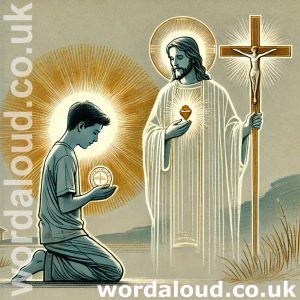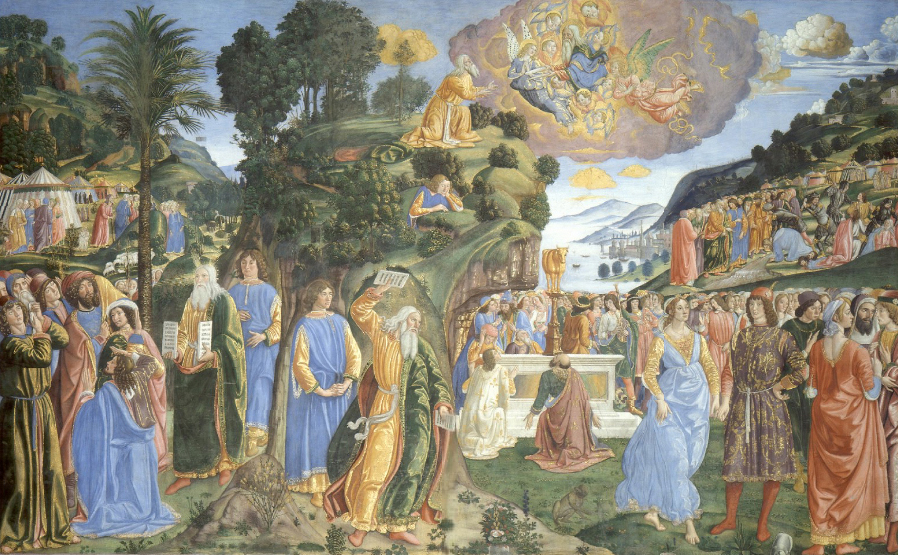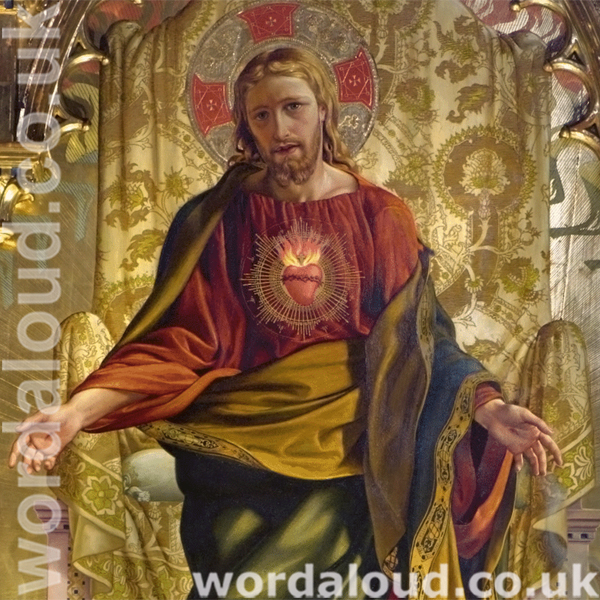Christian Art | Parable Of The Good Shepherd
John 10: 1-10 | Easter To Pentecost, Monday Week 4 | King James Audio Bible | KJV | King James Version
1 VERILY, verily, I say unto you, He that entereth not by the door into the sheepfold, but climbeth up some other way, the same is a thief and a robber.
2 But he that entereth in by the door is the shepherd of the sheep.
3 To him the porter openeth; and the sheep hear his voice: and he calleth his own sheep by name, and leadeth them out.
4 And when he putteth forth his own sheep, he goeth before them, and the sheep follow him: for they know his voice.
5 And a stranger will they not follow, but will flee from him: for they know not the voice of strangers.
6 This parable spake Jesus unto them: but they understood not what things they were which he spake unto them.
7 Then said Jesus unto them again, Verily, verily, I say unto you, I am the door of the sheep.
8 All that ever came before me are thieves and robbers: but the sheep did not hear them.
9 I am the door: by me if any man enter in, he shall be saved, and shall go in and out, and find pasture.
10 The thief cometh not, but for to steal, and to kill, and to destroy: I am come that they might have life, and that they might have it more abundantly.
Jesus links the symbolic imagery of the sheep, the shepherd and the sheepfold with the Temple and the Jewish authorities, and with their abuse of the Jewish people. In Bible times, it was the custom at night to bring a number of flocks of sheep into the protected area of the sheepfold, then at dawn the shepherds would each call to his own flock, and the sheep would recognize the voice of their particular shepherd and gather about him. Jesus has come to us as the one good shepherd who will unify all flocks to create one flock, one human family. We may also understand these verses as suggesting the role of those who minister for people spread all over the world in their various localities. Christ’s message now is that the sheepfold has been corrupted, specifically by the Temple authorities.
In these verses, the chief priests, the scribes and the Pharisees are said by Jesus to be thieves and bandits. They have control of the Temple, they profit from this control – we think of the cleansing of the Temple in John 2 – and they bring the people ultimately to death by preventing them from coming to God, because of their false ideas. Under their influence, the focus of the Temple has turned away from being solely upon God, and now they additionally prevent the people from recognizing Jesus as God the Son.
In the parable, Jesus presents himself both as the good shepherd and too as the gate of the sheepfold, the door through which the sheep may find life and salvation. The Temple of Christ’s body surpasses and obviates the Jerusalem Temple, which will be destroyed and then never again rebuilt, while Christ will rise from his death on the third day, to live and be with us forever. Jesus’ message is very clear: it is through faith in Jesus, through a love which is mutual and individual, each one of us in a one-to-one relationship with Jesus, that we will be saved, made free of our sins and have life eternal.
‘Through the Holy Spirit paradise is restored; we can ascend to heaven and regain our sonship. We can address God as our Father with confidence, we can share in the grace of Christ, we can be called children of the light and sharers in eternal glory; in a word we can become full of all manner of blessings in this world and in that to come.’ St Basil the Great
King James Audio Bible | Endnotes
Jesus describes himself as the good shepherd who enters the sheepfold through the gate and cares for his sheep. He says that his sheep know his voice and follow him, and he promises to lead them to green pastures and protect them from harm. He also contrasts himself with the thieves and robbers who come to steal and destroy, saying that they do not care for the sheep.
Jesus says: ‘Verily, verily, I say unto you, I am the door of the sheep. All that ever came before me are thieves and robbers: but the sheep did not hear them. I am the door: by me if any man enter in, he shall be saved, and shall go in and out, and find pasture.’
This statement underscores the idea that Jesus is not merely a shepherd, but he is the gatekeeper to the Kingdom of God. This means that access to God’s grace and mercy can only be attained through faith in Jesus as the Christ and his sacrifice on the cross.
In Jesus’ prayer in the Garden of Gethsemane, Jesus submits to God the Father’s will, saying: ‘O my Father, if it be possible, let this cup pass from me: nevertheless not as I will, but as thou wilt.’ This prayer demonstrates Jesus’ obedience and submission to the Father’s will, even though he knows that it will lead to his own suffering and death.
The connection between these two passages is that Jesus’ self-sacrifice on the cross was and remains the ultimate act of obedience to God the Father’s will. Just as the good shepherd lays down his life for his sheep, Jesus willingly gave up his life for the salvation of humanity.
Jesus says: ‘I am the door: by me if any man enter in, he shall be saved, and shall go in and out, and find pasture. The thief cometh not, but for to steal, and to kill, and to destroy: I am come that they might have life, and that they might have it more abundantly.’
This statement reinforces that Jesus’ self-sacrifice on the Cross is the gateway to the Kingdom of God, and that Jesus is more than a mere prophet.
This means that access to God’s grace and mercy can only be attained through faith in Jesus as the Christ and his sacrifice on the Cross.
In his prayer in the Garden of Gethsemane, Jesus submits to the Father’s will despite agony and fear he was experiencing. Jesus’ self-sacrifice on the Cross was the ultimate act of submission and love, and it shows the depth of his devotion to God and his desire to do the Father’s will.
Jesus’ self-sacrifice on the Cross demonstrates his power over sin and death and completes the parable – the meaning of which is that Jesus alone can provide salvation and eternal life.









